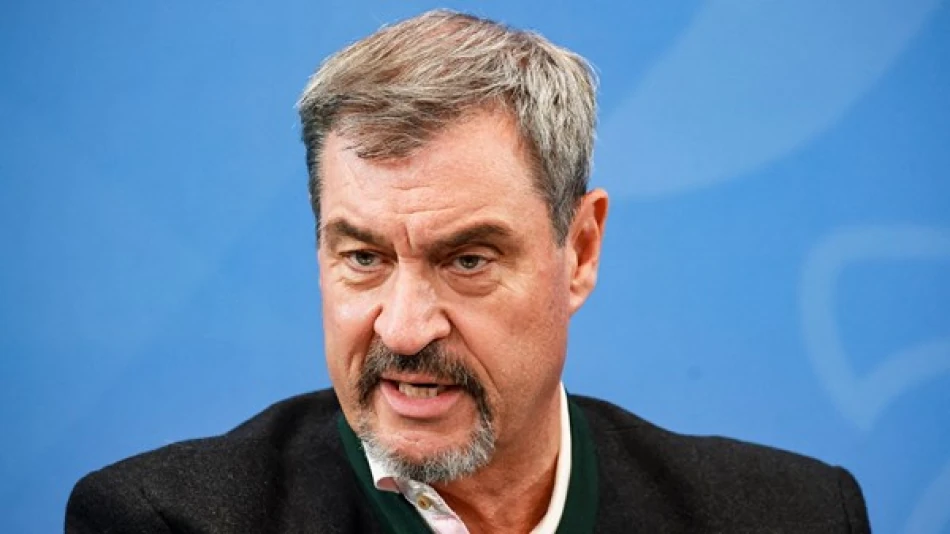
Prominent German Politician Weighs In on Potential Ukraine Troop Deployment
Bavarian Leader Rejects NATO Troops in Ukraine, Calls for Military-Age Refugees to Return
Bavaria's premier Markus Söder has categorically rejected any possibility of deploying German forces to Ukraine as part of NATO security guarantees, warning that Russia would never accept such arrangements and questioning Germany's military readiness. The Christian Social Union leader also sparked controversy by suggesting military-age Ukrainian refugees should return home to defend their country, while criticizing Germany's generous welfare system that he claims discourages Ukrainian integration into the workforce.
NATO Deployment Deemed Unrealistic
Söder's rejection of NATO forces in Ukraine reflects growing skepticism within Germany's conservative circles about post-conflict security arrangements. Speaking to German newspaper Rheinische Post, the Bavarian state premier argued that Russia would view any NATO presence as a precursor to Ukrainian membership, making such deployments politically untenable.
His assessment highlights a fundamental challenge facing Western policymakers: how to provide credible security guarantees to Ukraine without crossing Moscow's red lines. This dilemma has persisted throughout the conflict, with Germany consistently among the more cautious NATO members regarding escalation risks.
German Military Readiness in Question
Söder's blunt assessment that "the German military is not prepared for this" underscores Germany's ongoing defense capability gaps. His call for reintroducing mandatory military service reflects broader concerns about the Bundeswehr's readiness, which has faced chronic underfunding and equipment shortages for decades.
This military weakness constrains Germany's ability to contribute meaningfully to any future peacekeeping or security guarantee arrangements, potentially limiting its influence in post-conflict negotiations.
Controversial Refugee Policy Proposals
Söder's suggestion that military-age Ukrainian men should return to defend their homeland represents a significant shift in rhetoric around refugee policy. His argument that "it is legitimate to consider returning Ukrainians capable of military service to their homeland" could signal growing political pressure to reduce the refugee burden as the conflict drags on.
This position aligns with similar debates across Europe, where initial solidarity with Ukrainian refugees has faced strain from economic pressures and integration challenges. Poland and other frontline states have already implemented policies encouraging refugee returns.
Welfare System Under Scrutiny
The Bavarian leader's criticism of Germany's generous welfare provisions for Ukrainians highlights a broader integration challenge. Unlike typical asylum seekers, Ukrainians received immediate work authorization and access to full social benefits equivalent to German citizens. However, employment rates among Ukrainian refugees in Germany lag significantly behind other European countries, raising questions about policy effectiveness.
Germany's ruling coalition has already responded to such concerns, announcing that Ukrainians arriving after April 1, 2025, will receive reduced asylum-seeker benefits rather than full citizen allowances. This policy shift suggests growing political consensus that the current system requires adjustment.
Political Implications and Broader Context
Söder's statements reflect mounting pressure on Germany's political establishment as the Ukraine conflict approaches its third year. With federal elections looming, conservative politicians face growing demands to balance continued support for Ukraine with domestic concerns about military spending, refugee costs, and security risks.
His positions also underscore Germany's complex relationship with its NATO obligations and historical reluctance to deploy military force abroad. This cautious approach has drawn criticism from allies but remains popular with German voters wary of military entanglement.
The debate over Ukrainian refugees similarly reflects broader European tensions between humanitarian obligations and practical governance challenges. As the conflict continues, other EU nations will likely face similar pressures to reassess their refugee policies and security commitments.
Most Viewed News

 Layla Al Mansoori
Layla Al Mansoori






